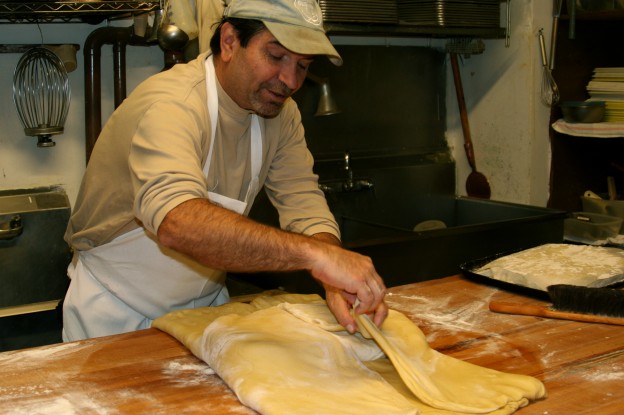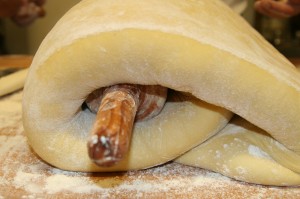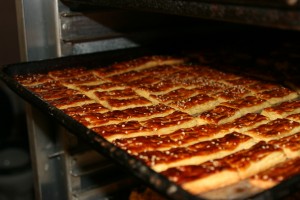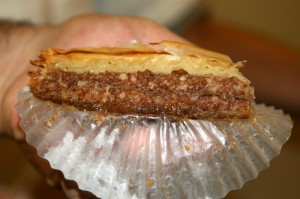“If you had told me when I was opening the bakery that I would be amazed by all the different customers coming in, I would have said ‘No, no, I am opening an Iranian bakery,'” Mohammad Tahmili told us, gesturing expansively with his rolling pin around the small bakery covered with Iranian posters and smelling of the warm dough, rich honey, and spices of Persian baked goods.
During the sunny, Sunday afternoon Sue McCrory and I spent in Tabrizi Bakery in Watertown, sipping tea and listening to owner/baker Mohammad speak as he opened, rolled and folded beautiful mounds of smooth, pliant dough, the shop door continuously chimed to signal the arrival of a customer from another corner of the world. In the space of a few hours, Mohammad greeted Algerian, Syrian, Turkish, Greek, Persian and English customers as old friends, and helped them to their favorite pastries, cookies and bread.
The transcontinental history of the recipes that Mohammad uses in his bakery tell a fascinating story of the movement of cultures and people around the globe. As a keystone geographic region in ancient global trade routes, Persian cuisine has permeated the baking cultures of Europe, Africa and even Asia, today driving a multicultural clientele into Mohammad’s modern-day Iranian bakery in America. And, for over 20 years and counting, Mohammad has been making traditional Persian baked goods on Mt. Auburn Street in Watertown, selling his sweets and flatbread in his front shop and at eight other groceries and restaurants in New York City.
Mohammad hails from Tabriz (hence the name Tabrizi Bakery), a city in northern Iran known for its food-sophisticated population that demands the best in Persian cuisine. “Do you know the Soup Nazi from Seinfeld?” Mohammad asks us laughing. “Yes, he is Iranian, he is from Tabriz! Guess what they call me in New York? I am the Cookie Nazi!” But more seriously he adds, “My dad has one rule: don’t make this cookie if you’re going to screw it up. Make perfection.”
In fact, Mohammad learned everything he knows about Persian baking tradition from his father who, til three years ago, owned his own bakery in Iran. Much like the pastries themselves, the family’s path to baking is full of storytelling and cultural exchange. “My dad started baking when he was 13 years old, when his dad got very sick […] Sixty something years ago it was still a luxury business in Iran, not everyone could afford cookies.” The Armenian baker that Mohammad’s father worked for, therefore, did not want his workers to learn everything about the recipes, for fear they would then quit and start a competitor bakery.
“My dad would memorize the weight of all the ingredients to try to learn the recipes, so the baker would put his shoe on the other end of the scale,” Mohammad told us. For two years he tried unsuccessfully to steal the shoe, until one day, Mohammad’s father made a very delicious lunch for his boss, and told him to relax and take a nap. The food was so tasty that the boss fell asleep more deeply than usual, and Mohammad’s father was able to steal the shoe and weigh it. “The next day, my dad quit to open his own bakery,” Mohammad concluded, with a wry smile.
These days, Mohammad drives ninety pounds of his cookies from Watertown to New York every other week. The demand for his cookies from NYC’s Jewish communities explains why his bakery is kosher — yet another way his recipes connect with a multicultural consumer base. He also must prep for the busy Saturday rush, when Iranians from across New England come into the bakery for bulk orders, which they in turn ship to relatives across the country.
“We ship to every state, except not usually California,” Mohammad tells us. “There are a lot of Iranians and bakeries in California.” Already, batches of freshly packaged cookies were stacked on high shelves around the bakery, ready to be driven south, or shipped west.
Sue and I were able to observe the beginning stages of his most popular cookie, the nazok, which he makes 150 pounds of each week. Nazok is a rectangular cookie brushed with honey and a sesame glaze. It contains 216 layers of flaky pastry that is so delicate the dough must be handled with the utmost precision and care.
As we watched, Mohammad folded in a sweeter, denser dough of flour, sugar, oil and vanillin into the base dough, kneading and rolling the two together, then opening and closing the doughy mixture three times. He carefully dusted off the excess flour at each step. The batch of dough was big and heavy (approx. 20 kilograms), and would yield up to 800 cookies. Mohammad makes the batch twice a week.
But the nakodi cookies were my favorite of the afternoon. Made with stone-ground chic pea flour and cardamom, the small clover-shaped, bite-sized cookies melted in my mouth. Seeing my look of surprise and pleasure, Mohammad exclaimed, “That is why we call them heavenly bites!”
Nakodi are not the only petite Persian treats baked at Tabrizi. Actually, the Persian tradition of small, bite- sized pastries and cookies is pacing far before America’s recent urban trend of cute-sy mini-desserts (micros) aimed at the newly healthy conscious, calorie-counting consumer. Persian baklava, for instance, made with almond and cardamom, is is cut into small traditional diamond shapes.
Due to demand, Mohammad also makes the larger, walnut and cinnamon based Greek baklava, which a Greek employee’s grandmother shared with him. He peeled the pastry paper off the side of one, showing us two thick layers of fine-ground walnut. “You are not supposed to taste just the bread in baklava!” he told us. (The triangle of bakalava I usually get from my closest House of Pizza was instantly ruined for all future take-out orders.)
Though Mohammad’s clientele is a diverse crowd from all across the world, it would be a stretch to say that Iranian treats have widely infiltrated American baking culture. A general lack of knowledge about Persian ingredients and tastes has created confusion for Mohammad in the past, including, most notably, a bakery in NYC who wanted him to replace a fresh batch of cookies thinking the pistachio was mold. Indeed, the three most essential ingredients in Persian baking according to Mohammad — cardamom, vanillin and rosewater — are not overly familiar to my neighborhood baker.
However, slowly, Mohammad’s bakery may be turning the unfamiliar into the craving you never knew you had. He told the story of one woman who asked to try a zolbi, a beautiful snow-flake shaped sweet associated with Ramadan made with yogurt and rosewater and dipped in sweet syrup after being fried. Rudely, she spat it out, and declared that she did not like Persian baked goods. Mohammad asked her not to judge an entire culture of food based on one taste alone.
“Soon, she came back and told me, ‘I have been thinking about that taste, may I order some more? I want to try it again'” Mohammad said. She ended up ordering two pounds worth of zolbi.
As this story was finishing, I watched as one customer came in and ordered a Napoleon. The Persian version that Mohammad makes is layered with custard, topped with fresh creme and is so light it barely registers in your hand. “I thought that was a French pastry?” I questioned, confused. Mohammad smiled, “Everybody makes them, the question is how.”
Tabrizi Bakery, 56 Mt. Auburn Street, Watertown, MA.






































Thanks, very happy to see successful Persian promoting our rich culture through all aspects of life and their friendly, welcoming, and people oriented personalities.
I have shopped at the Tabrizi Bakery for years. I lived in Mashad, Iran (the best food in the world- I beg to differ, though the food in Tabriz was good, too) and learned how to make many of the cookies you wrote of.
I no longer live in Boston, but on my trips to Boston I always try to make time to stop at Tabrizi.
Nice to see your article.
What a wonderful article and tribute to pure and beautiful talent. Not to mention the food is scrumtious. YUMMMY!!!!!!
Pingback: Nowruz « Eating In or Out